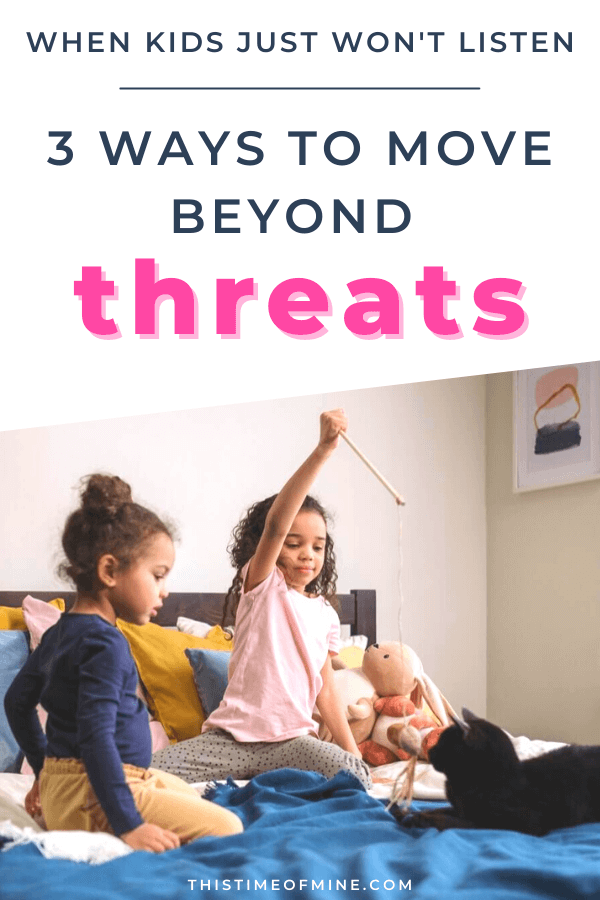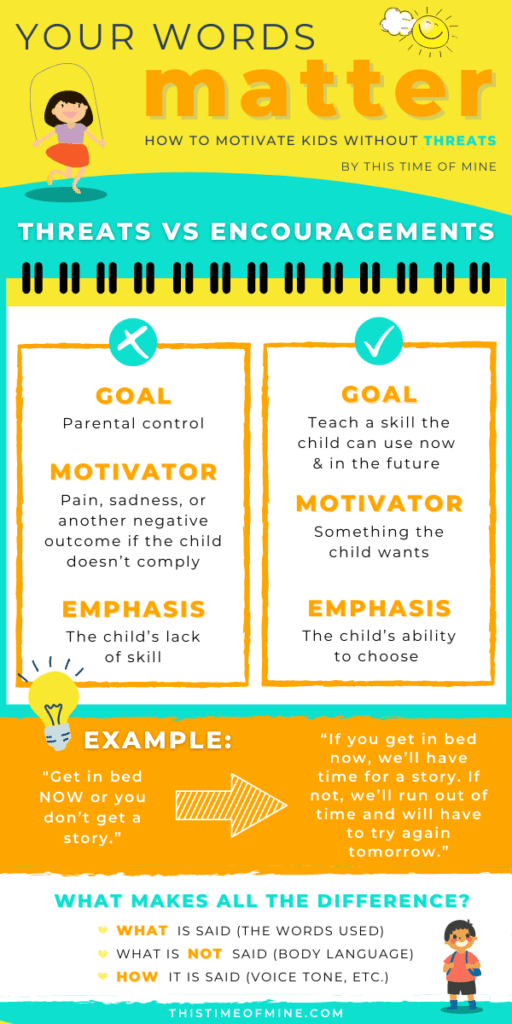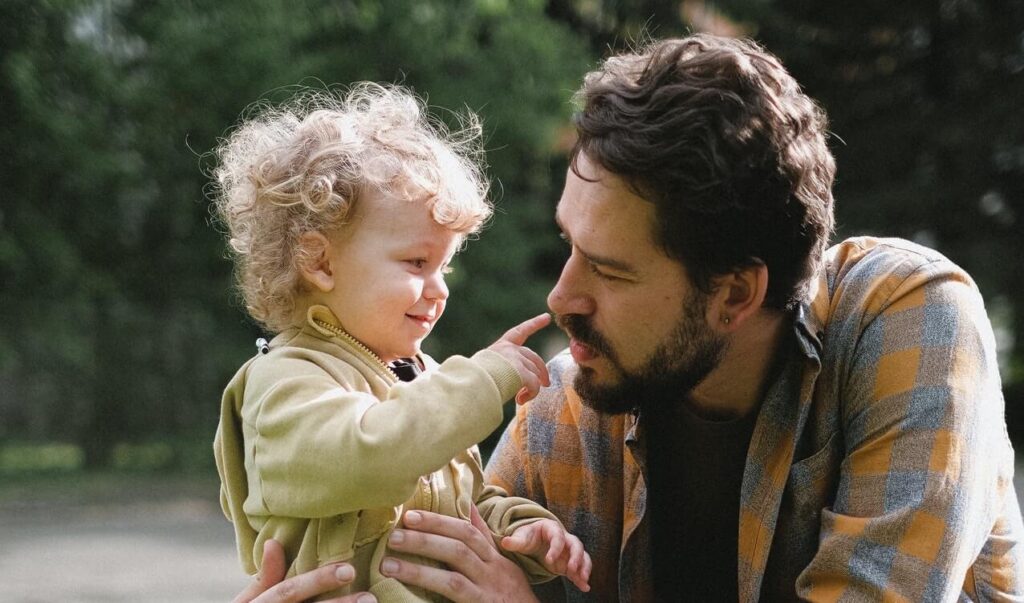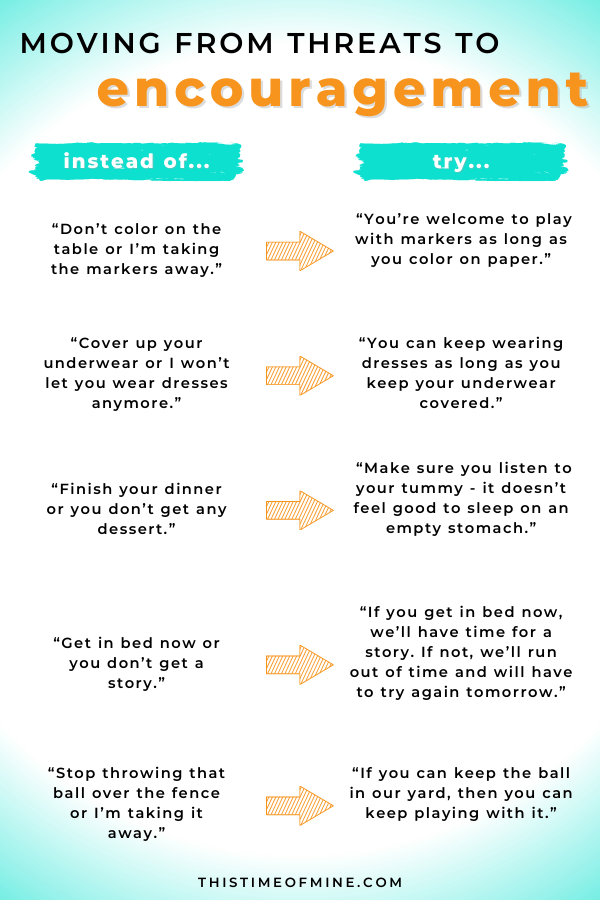When Kids Just Won’t Cooperate: 3 Ways To Move Beyond Threats
Tired of using threats to get your kids to cooperate? Find out how to open the door to effective teaching so your kids will WANT to obey!

“Get your shoes on right now or I’m leaving without you.”
If you’ve ever said something along these lines, you’d be in good company. In fact, threats like these are some of the most commonly used weapons in the parenting arsenal.
If only they worked.
It’s true that getting kids to cooperate can sometimes feel a little like trying to fit back into your favorite jeans after Christmas – you know there’s a good chance it won’t work, and it usually leaves you feeling defeated.
But luckily, resorting to threats isn’t the only option.
Imagine being able maintain consistency and boundaries without crossing over into fear-based tactics. Imagine having kids who obey without complaining?
Sounds pretty good, right?
Of course, there’s no one-size-fits-all solution to every situation. There are, however, a few key principles that can guide you in your efforts to diffuse high-tension moments and transform them into nurturing, teachable moments.

WHY THREATS DON’T WORK
Time for an honest moment: getting out of the habit of using threats takes effort.
After all, threats are easier. They don’t require much forethought. And they can bring immediate results.
But in the long run, threats actually require more effort because they aren’t accomplishing the true purpose of discipline, which is to teach.
Think of it this way – saying “get in bed NOW or you don’t get a story” might get your child to scoot into bed faster, but it’s only a band-aid fix. It’s not getting to the root of the problem, and could be a battle you have to fight again and again.
That can get exhausting pretty quick.
What if you approached the situation in a way that intrinsically motivated your child instead?
“If you get in bed now, we’ll have time for a story. If not, we’ll run out of time and will have to try again tomorrow.”
Both of these approaches deliver the same message and set the same boundary. But can you feel the difference?
Sure, the second approach might require a little more patience, especially at the end of a long day. But it creates an opportunity for your child to practice using her own decision-making skills using something that will continue to motivate her to get in bed without a fight now and in the future.
Win-win.
So how can you tell the difference between a threat and an encouragement like the example above? Here’s a side-by-side comparison:

Can you see why kids who are encouraged are usually more willing to cooperate than those who are threatened?
I should point out that encouragement is not bribing. It’s not promising a reward for compliance.
It’s empowering kids with the skills and motivation to make choices that will get them to where they want to be.
And that’s a skill that can benefit them through adulthood.
So how can we move beyond threats and encourage our kids to obey?
THE #1 SECRET TO GETTING KIDS TO COOPERATE
Okay, that headline might be a little misleading. After all, there’s no ONE secret that will work for every child every time.
But most successful parenting situations usually have one thing in common. It’s not a perfectly curated routine, 15 minutes of special time every day, or even the very best behavior chart.
As helpful as these things are, they’re not what gets a child to get in bed the first time we ask.
So what does?
The way we communicate.
When we’re able to speak in a way that sends the message, “I am not a threat,” we help calm the threat response (fight, flight or freeze) in our child’s brain and the stage for obedience.
Of course, kids are still kids and will rebel in their own little ways from time to time. But taking the few extra seconds to formulate a positive version of our requests will lead to more cooperation in the long run.
So let’s go over the 3 things that can change any statement from a threat to an encouragement.

HOW TO SPEAK SO KIDS WILL LISTEN
We all want our kids to just obey the first time we ask them to do something. But it doesn’t always work out that way, does it?
Luckily, resorting to threats isn’t our only option.
So what can we do instead? How can we get our kids to WANT to cooperate?
Believe it or not, our kids want to obey. It’s in their nature to want to please their parents. And we can encourage more of that cooperation by being aware of 3 things:
- What we say.
- What we don’t say.
- How we say it.
So yes, our words matter. But so does our delivery.
Let’s go over each of these 3 communication skills in a little more detail:
1. WHAT WE SAY MATTERS
Getting our kids to cooperate can sometimes be as simple as rearranging the words we say to create a more positive version. After all, when we start with “don’t,” they are much more likely to tune us out, push back, or even get surprisingly creative.
For example, my 3-year-old daughter is a notorious compromiser. If I say, “don’t lick the table,” (yes, that’s a big problem around here) it’s almost always followed by, “but can I lick the wall?” or, “it’s okay, I can lick the floor,” or a number of other undesirable alternatives.
Never underestimate a child’s creativity.
Here are a few examples of how you can reframe statements when addressing problem behavior:

Threat: “Don’t color on the table or I’m taking the markers away.”
Encouragement: “You’re welcome to play with markers as long as you color on paper.”
Threat: “Cover up your underwear or I won’t let you wear dresses anymore.”
Encouragement: “You can keep wearing dresses as long as you keep your underwear covered.”
Threat: “Stop throwing that ball over the fence or I’m taking it away.”
Encouragement: “If you can keep the ball in our yard, then you can keep playing with it.”
Threat: “Finish your dinner or you don’t get any dessert.”
Encouragement: “Make sure you listen to your tummy – it doesn’t feel good to sleep on an empty stomach.”
Threat: “Clean up your room or I won’t let you play with your friends.”
Encouragement: “As soon as your room is clean, you can play with your friends.”
Threat: “If you hit your sister again, you’re going to your room!”
Encouragement: “I can see you’re upset, but I can’t let you hit your sister. Can I hold you until you feel better?”
Threat: “Get in bed now or you don’t get a story.”
Encouragement: “If you get in bed now, we’ll have time for a story. If not, we’ll run out of time and will have to try again tomorrow.”
2. WHAT WE DON’T SAY MATTERS
Imagine saying the statement, “It’s time to be done,” in two very different ways:
- With your hands on your hips looking down at your child
- With a soft face while on your knees at your child’s eye level
Nonverbal language speaks much louder than words.
Of course, it’s not possible to be fully engaged every time we speak to our kids. But when we really need to get a child’s attention, we can use our nonverbal communication to make sure our message gets through.
Because in the end, it’s what we don’t say that our kids believe most.
3. HOW WE SPEAK MATTERS
Let’s use the statement, “It’s time to be done,” once more. This time, notice how each delivery sends a unique message:
- In a loud, angry voice
- Muttered softly through clenched teeth
- In a calm, neutral voice
- Sung in a silly opera voice
Remember, our goal is cooperation. And the best way to encourage kids to cooperate is to be a calm, strong and steady presence for them.
It also helps to use humor. Lots of it.
Does it take extra effort, especially when you’re tired after a long day? Absolutely.
But fighting a battle with an equally tired and cranky child takes just as much effort, if not more. So why not give humor a try?

HELP! MY KIDS STILL WON’T COOPERATE!
There are a few non-negotiables in parenting. You don’t have to compromise safety or allow your kids to destroy property.
But there’s one thing you should know: you don’t have to win every battle you’re invited to.
When dealing with difficult behavior, do your best to stay calm (even if you need to leave the room for a moment) so you can approach the situation with a clear head.
And then pick your battles.
If it’s something that requires you to step in, make connection your first goal. Once your child knows that you’re on their side, they’ll be much more willing to calm down and let you lead.
From there, you can try some of the communication strategies above.
WHAT IF I MESS UP?
Just restart!
You’d be hard-pressed to find a parent who hasn’t given in and used threats to get their kids to cooperate. We all do it.
The key is to just try again. And again. And again.
In fact, you can even restart the moment a threat escapes your lips. “Oops, I’m sorry. That’s not how I should have asked. Let me try again.”
Starting over is so powerful because you are modeling exactly what it’s like to learn from mistakes. Your kids will see that you are putting forth the effort and they will learn how to repair riffs in their own relationships.
By being aware of the ways to communicate more effectively, we can encourage more positive interactions with our kids, see more cooperation, and even teach some skills along the way!
Do you struggle with this? How have you learned to reframe your words to get your kids to cooperate? I’d love to know in the comments!
OTHER HELPFUL POSTS:
- How To Turn A No Into A Yes (And Still Set Clear Boundaries)
- How To Mistake-Proof Your Relationship With Your Child
- Yelling Does NOT Make You A Bad Parent – Here’s Why
- 5 Simple Ways To Discipline Without Yelling
want to remember this?
PIN IT TO YOUR FAVORITE BOARD
Share this article:

